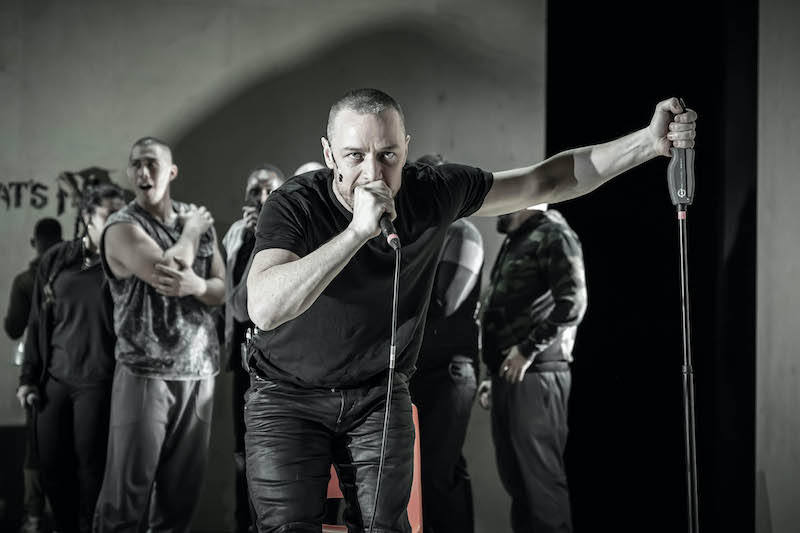“Live” on-screen broadcasts of stage plays put movie reviewers in a quandary: Am I reviewing a play? Or am I reviewing a film? The “live” broadcast of the National Theatre’s production – in actuality a Trafalgar Entertainment production, not the National’s – of Cyrano de Bergerac, screening this Thursday February 20 at the Kino, is a case in point.
This reviewer saw Cyrano from the stalls of London’s Playhouse Theatre back in December. Spoiler alert: He is not planning to relive the experience on film.
Don’t get me wrong. I am a big fan of simulcasts. Watching Scala Milan’s production of Tosca (screened at the Kino on February 13) from a comfy seat locally, was, to my mind, a treat not to be missed. Re-watching Trafalgar’s Cyrano on screen would be downright painful.
Edmond Rostand’s verse drama was a huge hit when it opened in Paris in 1897. Contemporary audiences, worn down by the stark realism of plays by Ibsen and Balzac on offer elsewhere in the city, thrilled to Cyrano’s heady mix of romantic love, lyric poetry and flashy swordplay.
In case you missed out on any of the scores of opera, stage, radio, and film adaptations (including a 1959 samurai version with Toshiro Mifune in the title role) of recent years, here’s what you need to know before you take your seat:
Cyrano de Bergerac is a musketeer – yes, one of those Musketeers; D’Artagnan has a walk-on in Rostand’s drama – and is famed for his quick wit, sharp sword, and talent for verse. One thing alone stands between Cyrano and Roxane, the love of his life: his enormous nose.
Love-lorn, Cyrano masquerades as the handsome Christian, a comrade in arms struck dumb by Roxane’s beauty, using his, Cyrano’s, own poems, own letters, and even his own voice in a moonlit balcony scene to woo Roxane on the witless Christian’s behalf. Love blossoms, tragedy follows close behind. Christian dies in battle; Roxane, heartbroken, cloisters herself in a nunnery. 15-years speed by. Cyrano, mortally wounded in an ambush an hour before, pays a last visit to Roxane. As our musketeer recites Christian’s last precious letter to her from memory, Roxane realises the poet she so loved in Christian was Cyrano all along. Cyrano, with his dying breath, re-stakes his lasting claim to love and beauty in a single word: panache.
Cyrano’s panache, flair if you like, is what Martin Crimp’s adaptation of Rostand’s romance sorely lacks. What director Jamie Lloyd’s production lacks is the nose.
Crimp, whose last outing (When We Have Sufficiently Tortured Each Other) was staged at the National with Cate Blanchett in a cross-dressing lead, looted a rarely-read 18th-century novel by Samuel Richardson to prop up his play. In Trafalgar Entertainment’s production of his latest, Crimp loots Cyrano. What he did for Richardson, he does here for Rostand, re-scoring the French poet’s lilting alexandrines as boot-stamping, mic-popping rap and depriving the original of its most enduring quality: lyricism.
Jamie Lloyd, rated as the ninth most influential theatre-person in the UK by The Stage, made a dramatic choice in depriving lead-actor James McAvoy of Cyrano’s most prominent attribute. (The absence is deftly dodged in Crimp’s text but remains the elephant in the room. Cyrano refers to it as his “elephunt”.) Lloyd’s rapping actors – all admirable servants to the cause – switch from hand-mikes to stand-up mikes, relying on face-mikes to make their rhymes heard. The device sort of works on stage; who knows how it will play on film.
Anthony Burgess (A Clockwork Orange), whose verse translation of Rostand’s play stands for now as the definitive English-language version, had this to say in his preface: “No play is rubbish if it pleases and if it takes money at the door.” Trafalgar Entertainment whose parent company, if you delve deep enough, is the US insurance giant MassMutual Holdings with $771 billion on account is raking in plenty of that. There is not enough pleasure in Crimp’s re-working of Rostand’s classic to save it from the bin – on screen or off.
Image Credits: Marc Brenner https://cyranodebergerac.ntlive.com/gallery/ .




I saw this last night at the Kino, and I found it an excellent, challenging update of the classic story, creatively and provocatively staged, with strong performances all around. The changes made necessary when moving from stage to a filmed performance worked to its advantage—the camera told the audience where to focus, and the close-ups, impossible on stage, were devastatingly effective. That one slow tear leaking from Cyrano’s eye…